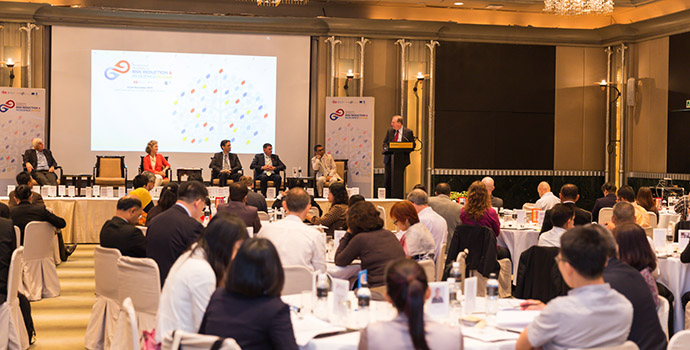- About Us
-
Who we are
-
- Publications
-
- ADPC Academy
-
MediaADPC'S NEWS
Practitioners call for joint efforts to address the complex problems of disasters and climate change in Asia Practitioners call for joint efforts to address the complex problems of disasters and climate change in Asia
23 - 25 Nov 2015
Bangkok, Thailand

According to the United Nations, over 40 percent of all global disasters occur in Asia-Pacific causing an average of 40,000 deaths, affecting more than 163 million people, and resulting in economic losses worth 23 billion USD each year. Experts in disaster risk reduction from more than 20 countries met last week in Bangkok and emphasized the need for innovative solutions between natural hazards and climate change to build sustainable and resilient development.“Disaster risk reduction is everyone’s business,” said Shane Wright, Executive Director of Asian Disaster Preparedness Center echoing the international community’s recent discussions. “Governments, the private sector and the civil society need to work collectively for better outcomes, and the Sendai Framework for Disaster Risk Reduction is key to making that happen,” he continued.
From 23 to 25 November, Asian Disaster Preparedness Center, the European Commission’s Directorate General for Humanitarian Aid and Civil Protection (ECHO), Food and Agriculture Organization of the United Nations, the International Federation of Red Cross and Red Crescent Societies, and the United Nations Development Programme jointly hosted representatives from more than 20 countries for the 8th Practitioners’ Workshop on Risk Reduction and Resilience in Asia.
The outcomes of the workshop will provide consistency in national level activities across the region for the next few years, building on the Sendai Framework. With a combined presence of government, non-governmental organizations, donor agencies, and civil society organizations, the workshop participants aimed to draw conclusions relevant also for the climate change conference in Paris next month.During the three days, parties worked to identify solutions to current phenomena, such as the severe drought caused by El-Niņo and its impact on a variety of sectors including agriculture in Asia-Pacific. They emphasized the importance of equipping local communities with the skills and knowledge necessary to prepare for natural hazards, mitigate the impact of disasters, and provide immediate response in the aftermath.
Practitioners agreed that collaboration across agencies and the utilization of new technologies will be central in ensuring risk-informed decision-making and sustainable development in the Asia-Pacific region.
Latest NewsRelated Trainings
-